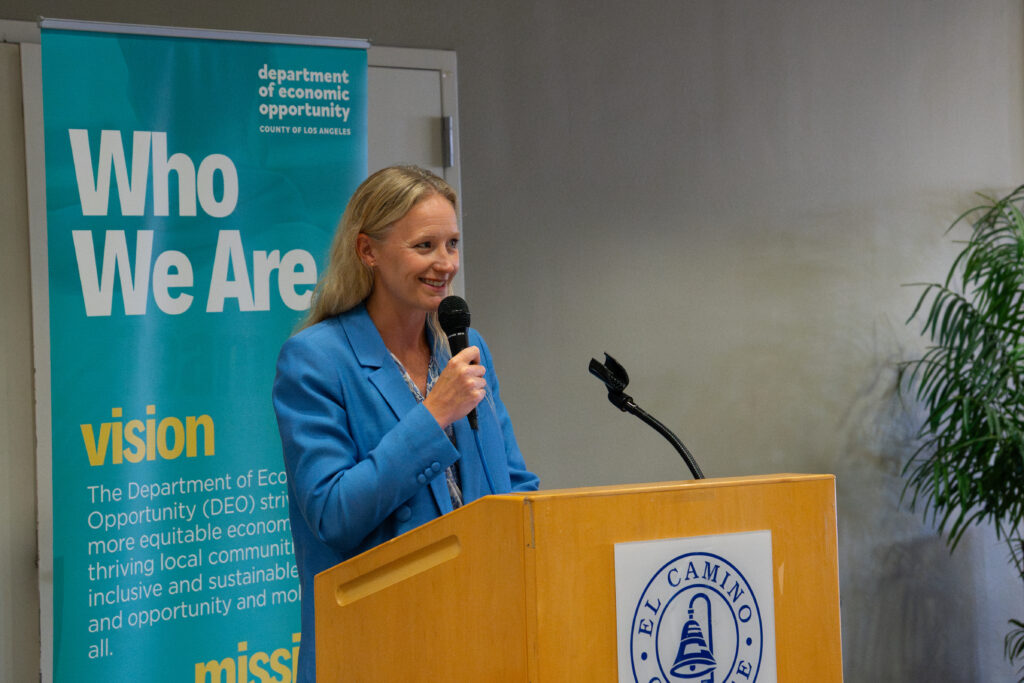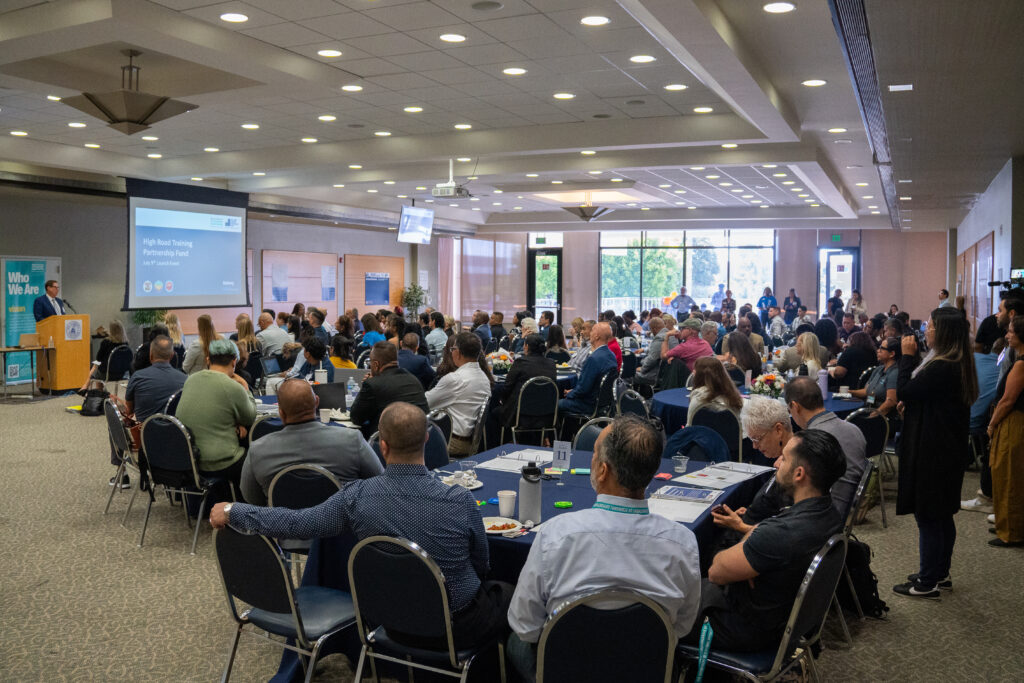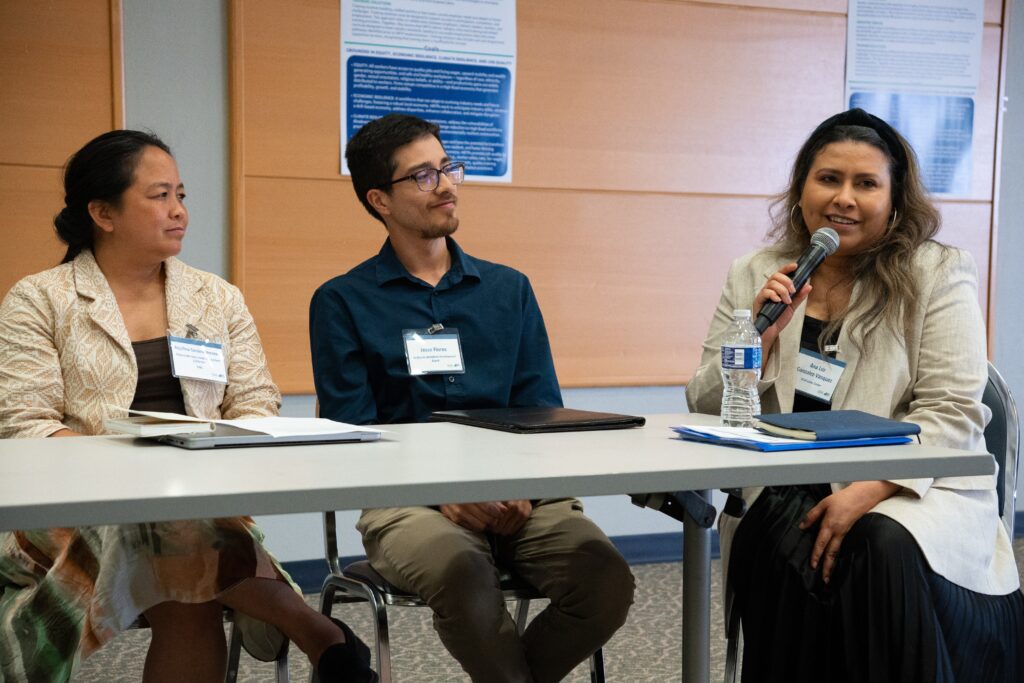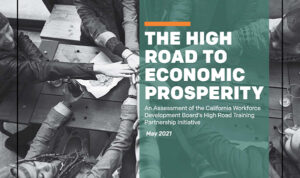
By Simone Frank
The UCLA Labor Center, Los Angeles County Department of Economic Opportunity (DEO), and government and community partners gathered on July 9, 2025 to host the kickoff convening of the High Road Training Partnership (HRTP) Fund—bringing together 19 grantees who will build new opportunities for underserved populations across Los Angeles County.
A $17.8 million grant program, the HRTP Fund will serve 1,300 workers through equitable worker and industry-informed training programs designed for communities most impacted by the COVID-19 pandemic and economic and racial inequities.
The UCLA Labor Center’s POWER in Workforce Development team has been awarded with $4.1 million of the grant to provide technical assistance to grantees and lead the program’s evaluation through 2026. Over the last few years, the team has played a key role in shaping California’s HRTP initiative and brings expertise in creating workforce systems that promote good jobs, equity and long-term sustainability.
The convening began with a warm welcome from Saba Waheed, director of the UCLA Labor Center, who congratulated grantees on their selection and emphasized UCLA’s commitment to economic equity, racial and immigrant justice and worker power. Waheed noted that HRTPs have long been a central focus for the UCLA Labor Center.
“The HRTP initiative offers a transformative vision for the future of work by fostering worker-centered industry partnerships that prioritize job quality, equity, and climate resilience. By continuing to align workforce training with high-road standards, HRTP has the potential to uplift thousands more workers, ensuring access to family-sustaining jobs and building stronger, more resilient regional economies.” said Magaly López, associate director for POWER in Workforce Development.

As a “community of practice” convening, the event focused on providing education, training, facilitated feedback and an ongoing support network for grantees and their partners—serving as a supportive space that fosters collaborative problem solving between the grantees and their partners.
Following the welcome, López introduced the goals of the convening: to build a strong support network across employers, labor, workers, and community organizations; to deepen the understanding of HRTP principles and program expectations; to connect with industry partners; to work on theory of change (ToC) logic models; and to gain an understanding of the grant evaluation process.

The agenda then kicked off an HRTP panel discussion moderated by Kate Vacanti, assistant director of the LA County DEO, featuring the following panelists:
- Aaron Valencia, founder/CEO, Lost Angels
- Aqui Soriano Versoza, executive director, Pilipino Workers Center (PWC)
- Ana Luz Gonzalez-Vasquez, project director, UCLA Labor Center POWER in Workforce Development
- Jesse Flores, field specialist, California Workforce Development Board
Soriano Versoza shared the importance of workforce training programs, noting that worker centers such as PWC play a critical role in ensuring workforce programs remain rooted in the real experiences of workers. In particular, PWC’s Caring Workforce Training Program aims to provide necessary support to caregiving workers such as skills training, higher wages and benefits, and an expansive network with access to resources. These community-based organizations provide vital services, leadership development and advocacy to workers often left unprotected from labor rights violations, including immigrants and low-wage earners in industries like homecare.
“The Caring Workforce Training Program came out of learning about the workforce development system and how we can provide and design a program that is worker-centered, industry-led, and connected for successful training and placement into good jobs. This is especially vital for immigrants and low-wage workers who are working in the homecare industries and the private sector of those industries.” said Soriano Versoza.
By centering workers in these programs, HRTPs help shift power to the workers, build long-term equity and ensure that economic recovery efforts reach those who have historically been left behind.

Later on in the convening, grantees participated in a hands-on theory of change (ToC) session designed to help align their programs with HRTP principles and long-term impact goals. ToC is a visual and narrative roadmap that explains the industry and workforce challenges and how the proposed program will respond to these challenges, and outlines the intended systems-level change. UCLA Labor Center technical support facilitators Gaby Gil and Marisabel Perez led grantees through the foundational elements of a strong ToC as well as a logic model—which provides guidance to plan, communicate, evaluate and report on the grantee’s program and achieve the HRTP’s goal of job quality and equity in the workforce.
“[The ToC] was engaging and gave grantees a chance to get feedback from Ana Luz or Magaly, who designed the project. It sparked a lot of engaging conversations and gave grantees an opportunity to reflect on the purpose and potential impact of their work.” said Perez.
To close out the day, grantees reflected on their learnings and identified areas of support needed moving forward. The next community of practice convening will take place in October.



